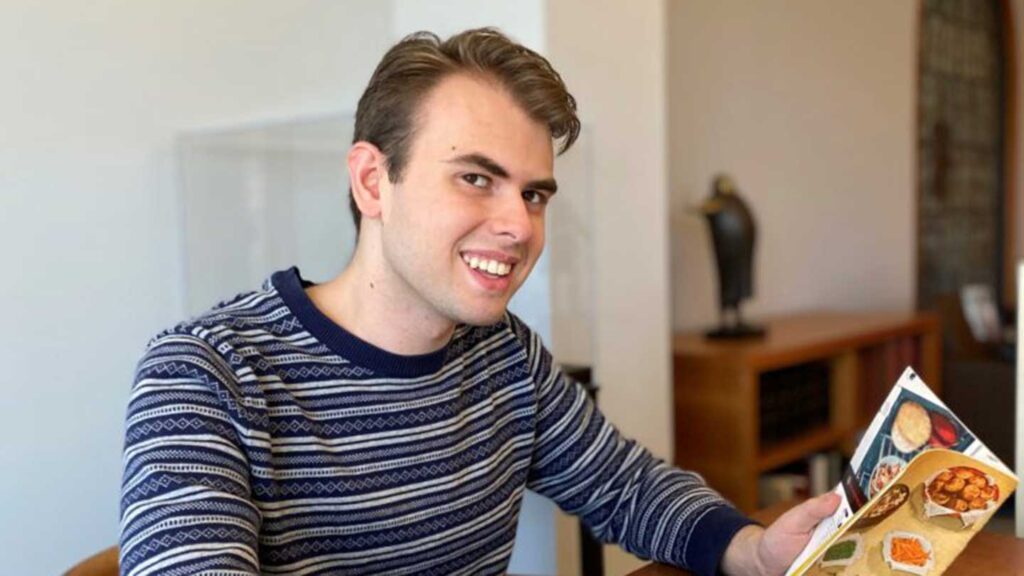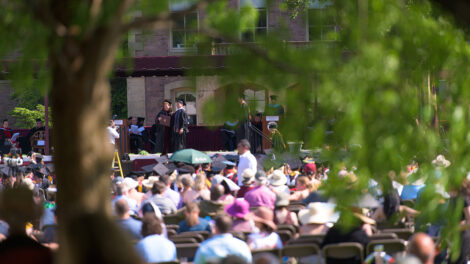Describe your senior year in three words.
Embracing. Becoming a senior is really weird! All of a sudden, you’re in charge of organizations, underclassmen look up to you for advice and guidance, and you begin to produce high-level work at an incredible rate. Becoming a senior required me to embrace these roles, have confidence in myself and trust in the teams I lead and the people around me, and hold myself and others to high standards. There are lots of other kinds of embraces as a senior, too: embracing new theoretical directions on your academic work, and embracing President Nicole Farmer Hurd every time you see her.
Independent. Senior year was a time when I had lots of autonomy to choose my academic and professional direction, and where I ultimately had the opportunities to define what my year would look like, whom I would spend it with, and what I would learn. I undeniably depended on the support of others, but senior year was a time to define what my values meant to me and how I would put them into action in service of others, and to hold myself accountable to practice them every day.
Mealtime. Sharing meals with others became spaces to share academic ideas, listen to others’ stories and share my own, provide advice and support, ask for advice and support, and connect in ways that seem mundane but can be incredibly intimate. From Upper Farinon to Las Delicias, eating on and off campus became a way to experience new worlds, in the food and the people I shared it with. Plus, this year I had the privilege of working with Special Collections on an exhibit on the library’s food studies and food ephemera collection!
What does being valedictorian mean to you?
I hope it means I gained new perspectives and grew in empathy through learning. Most of all, I hope it means I used my education to create new knowledge that matters.
What’s your favorite Lafayette memory?
Eating Senegalese dibi (lamb barbecue) with my dear friend Lauren Ameruoso ’22 in Dakar on the interim trip. Lauren and I have bonded over food since our First-Year Seminar with Prof. Rebekah Pite, and the delicious food, great company, and intensive learning was a real culmination of everything that Lafayette offered me.
What’s the most impactful class you took?
I had an incredible time in Latin American Ethnography with Prof. Monica Salas Landa. The theoretical texts and ethnographies we read helped me gain a perspective on the experiences of everyday life in Latin America and the ways that small interactions have great meanings; they changed my assumptions about the world, too. But what stood out the most in that fully virtual class was the way everyone had so much passion for the subject during discussions. A group of people linked together by a common love and inspiration can do incredible things.
Who was the most influential person during your time at the College?
While there have been many incredible friends and mentors I’ve gained in the last four years, the answer is undeniably Prof. Louisa Foroughi. I wrote my honors thesis—which investigated the lives of female servants and discourses around servitude during the English Restoration of the 1660s—with her, and her dedication to student success is exactly what I wanted from my Lafayette experience. Every meeting with her challenged me to define why I was doing what I was doing, to refuse to accept simple answers, and to consider how my education and academic interests will best serve humanity. Her courses emphasized the importance of method, utilized a variety of creatively planned assignments and modes of learning, and, above all, reminded me that the world has always changed and we can change it in the future.
I should also give a few shoutouts to some incredible student mentors who shaped me into a better leader, including Gabby Tropp ’20, Kelsey Moum ’21, and Alisha Ganghadaran ’21.
What will you miss most about Laf?
The ability to totally nerd out about what you love with anyone! And the ways that the community comes together to listen to each other, and care deeply about what makes someone unique and special. Everyone here is a little bit quirky and has a spark inside of them! Lafayette is a special place, but it isn’t magic; it’s a result of the work that faculty, staff, and students put in, and the way they lead authentically and with love.
Describe your biggest challenge and how you overcame it.
My greatest challenge was finding ways to involve myself deeply in causes I cared about while having so many different pressures on my time and the time of others. It’s easy to commit to too many things in an effort to become busy and fill up a schedule; what is more difficult sometimes is honing in on specific areas that make the greatest impact and require the greatest commitment. Learning how to say ‘no’ with confidence and grace helped me to say ‘yes’ to organizations and causes that spoke to me most intimately, and gave me the opportunity to connect with people who share those passions and values.
What do you wish for your fellow graduating classmates?
I hope we each don’t just change the world, but remake it and reimagine it, integrating ourselves into whatever communities we become a part of after Lafayette and working with them to achieve a better future. To do so isn’t always easy, and it might require sacrifices, but it is always worth it.
What advice would you give to your first-year self?
It’s OK to not be the finished product. You might not know yet what sets your heart on fire, but that’s normal. Listen to others—friends, professors, administrators—and take inspiration from them as you build your own life. Most people are going through those same challenges, and if you leave as the same person you came in as, then you probably did something wrong. All that matters is that you can go to sleep every night proud of the choices you’ve made and the impact you’ve made on the world.
What words of wisdom would you like to share with upcoming seniors?
Everything about senior year seems frenetic and hectic, but take some time out to appreciate the people you’re with and the community that surrounds you. Make sure to share your gratitude and appreciation for those you love regularly. And, get up early on Saturday mornings; you can’t miss the Easton Farmers’ Market!
How has Lafayette changed you?
Lafayette taught me what it meant to be a part of a community. Community requires authenticity; it requires everyone being free to be the best version of themselves, to know that they’ll have a home as they explore new ideas and concepts of self. Being in community with Easton, too, requires the decentering of the self and the recentering of what we share in common—our destiny, linked by our physical place. Being part of the Lafayette community, above all, means leading with empathy and love, finding and disentangling systems instead of relying on Band-Aid solutions, and always listening before speaking.
How do you hope to change the world?
I hope to engage deeply with the communities I am already a part of and that I become a part of, collaborating to rectify injustices and create powerful connections. In a world that can be incredibly unkind, sometimes what can change the world is a few acts of kindness.
The most important thing you learned about yourself at Lafayette is:
Everything I do needs to be done with intention. On a campus with so much to offer, it was crucial for me to define my values and to be comfortable in my own voice so that I could leave an impact that I was proud of. Interrogating your own motivations for doing something, and unpacking what those motivations really mean, brings a critical perspective that allows each of us to live lives of purpose.

